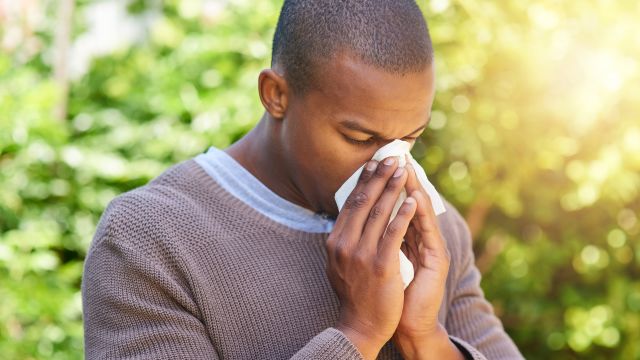Updated on December 1, 2022.
If you have allergies, you may have noticed your symptoms getting worse with each passing year. It’s a trend many experts attribute to rising temperatures associated with climate change. According to the American Academy of Allergy, Asthma and Immunology (AAAAI), our shifting weather patterns increase both the levels of pollen in the air and the amount of time it’s airborne. One March 2022 study published in Nature Communications even projected that by the end of the 21st Century, pollen season will start up to 40 days earlier and last up to 19 days longer than it does currently.
“Over the past several decades, we’ve seen a steady rise in seasonal pollen levels and in the number of adults experiencing allergies for the first time,” says Clifford Bassett, MD, founder and medical director of Allergy and Asthma Care of New York, and author of the book The New Allergy Solution: Supercharge Resistance, Slash Medication, Stop Suffering.
And while some people have seasonal allergies, Dr. Bassett notes year-round allergies caused by dust mites and pet dander may be worsened by airborne allergens like pollen.
The good news is that no one needs to suffer through allergy season. By working with your healthcare provider (HCP) and employing a few smart strategies, it’s possible to find relief and take charge of your allergies.
Check pollen counts daily
“Climate change has led to warmer climates, early spring season, and longer and later seasons that allow for the eyes, nose, and throat to be exposed to pesky pollen,” Bassett says. “In addition, urban areas and cities are more likely to have greater level of air pollutants, causing more intense allergy seasons.”
To help prepare yourself, Bassett recommends getting in the habit of checking the pollen count in the same way you consult the weather forecast. If it's high, try to stay indoors and close your windows. Think about purchasing a good mask and sunglasses for outdoor activities like yard work and shower to wash off allergens before going to bed.
Being aware of the types of allergens floating around may help, too.
“In areas of the country where you have three or four seasons per year, allergy season may start in February and March depending on the weather,” Bassett says. “It can begin with tree pollen, going through spring until just before early summer in many areas. Grass pollen season also overlaps and appears again in many areas by mid-spring and through summer." Lastly, he adds, weed and ragweed pollen levels rise during summer and go into the fall. Mold allergies can happen anytime.
To check for specific pollen and mold counts in your area, visit the American College of Allergy, Asthma and Immunology pollen count website at pollen.aaaai.org. Once you’re there, you can also register for email alerts regarding pollen level changes in your area.
Get a head start on treatment
If you have seasonal allergies, it’s best to start treatment before your symptoms become severe.
Bassett takes a proactive approach with his patients by offering allergy medications as pre-treatment a few weeks before pollen season kicks into high gear. “By taking preventative measures to reduce allergies before symptoms occur, we can attempt to defeat Mother Nature, leading to better control of symptoms throughout the season,” he says.
Steroid nasal sprays are the first-line treatment for seasonal allergies and can be obtained via prescription or over the counter (OTC). Flonase Allergy Relief and Rhinocort Allergy are two popular products. Some people manage their allergies with OTC oral antihistamines such as loratadine (Claritin) or cetirizine (Zyrtec), while others may need to consult an HCP if nonprescription medications don’t help or if allergy symptoms worsen.
Consult an allergist
Purvi Parikh, MD, an allergist, immunologist, and spokesperson with the Allergy and Asthma Network, and cofounder of the Parikh Institute of Research at NYU Langone Health in New York City, says that while mild allergies or occasional flare-ups may be controlled by OTC medications, you should talk to your HCP if you experience symptoms such as chronic sinus infections, nasal congestion, or difficulty breathing.
“For long-term allergies, patients often do better with a nasal steroid (such as Flonase or Nasonex),” Dr. Parikh says. “Unlike nasal decongestant sprays (such as Afrin) that are only supposed to be used for a few days and can cause rebound congestion, steroid nasal sprays reduce swelling and sensitivity in the nasal passages, making them less susceptible to allergy triggers.”
Your HCP may also refer you to an allergist. Parikh says some patients may be good candidates for allergy shots or sublingual immunotherapy (where a pill is taken orally and dissolves under your tongue). Both of these treatments start by introducing a patient’s immune system to a small bit of pollen weekly, eventually making them less sensitive to the allergens.
Allergy-proof your home
In addition to managing seasonal allergies with medication, Parikh says it’s also important to allergy-proof your home against indoor allergens including dust, mold, and pet dander. Providers can even provide blood tests to determine exposure or sensitivity to these and other allergens.
“Bedrooms are the most important rooms to allergy-proof,” Parikh says. “Vacuum frequently since rugs and carpet can trap allergens. Put hypoallergenic covers on your mattress and pillows to protect against dust mites, the tiny organisms that live in the dust and fibers of household objects.”
Washing your sheets once a week can also get rid of built-up allergens, Parikh says. Having an air purifier in your bedroom can help filter out pollen, pet dander, and mold spores and help improve air quality.
Ultimately, allergy seasons may only get worse, but improving your awareness, treatment strategy, and home environment could save you a lot of misery—and tissues.







